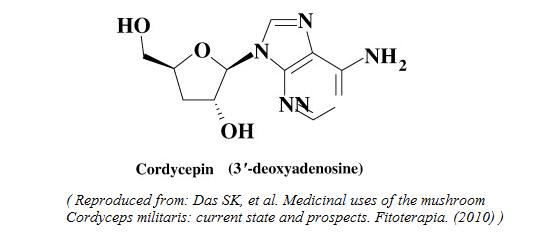Cordyceps can reduce HcG and cAMP-stimulated steroidogenesis (via PKA and possibly inhibiting P450scc by 30%, the enzyme that converts cholesterol to pregnenolone).[20] This same study showed that Cordyceps did not reduce testosterone production when coincubated with androstenedione or pregnenolone, suggesting it does not influence enzymes in the later portion of steroidogenesis.[20] Interestingly, this study also showed that Cordyceps was able to inhibit Forskolin-induced steroidogenesis, which is cAMP-induced and how the herb Coleus Forskohlii increases testosterone.[20] This inhibition of testosterone synthesis stimulated by cAMP and HcG has been noted elsewhere,[21][22] and inhibition of PKA abolishes the effects of Cordyceps.[23]
In cell stimulated at the Luteinizing Hormone (LH) receptor, which normally induces steroidogenesis via a cAMP-dependent pathway, the incubation of Cordyceps can suppress this cascade
In cells not intentionally stimulated with HcG, Corcyceps extract reliably increases testosterone secretions from cells with an ideal concentration of 3mg/mL, shown in two separate studies on dose-response.[14][21] Concentrations greater than 10mg/mL are associated with declines in testosterone related to baseline.[21] Protein fragments in Cordyceps have been implicated in being the active compounds[14] although Cordycepin appears to be active as well.[23] Feeding isolated Cordycepin at 40mg/kg bodyweight does not increase testosterone in vivo, however, yet it does when injected suggesting poor bioavailability.[23]
Had the opposite effects in cells note treated via the LH receptor, and may increase testosterone secretion in these scenarios
The mycelium of Cordyceps Militaris at 1 or 5% of their diet by weight was shown to increase circulating testosterone levels in rats after 6 weeks of supplementation. [24] During this period, bodyweight did not significantly differ between groups, sperm content of the epididymus increased by 53% and 37% respectively to the 1% and 5% diets and motility increased by 31% and 19%; serum testosterone was increased to around 700pg/mL relative to control fluctuating just below 600pg/mL over the 6 week period. The peaks were erratic and demonstrated a trend to significant differences at 2 weeks in the 5% group, declining to baseline at 5 weeks, and then spiking up again to be significantly different at 6-8 weeks; 1% intake was relatively stable up to 5 weeks were it trended upwards and remained significantly different from control until cessation at 8 weeks.[24] Another study conducted in immature mice (without the influence of Luteinizing hormone, to stimulate central hypogonadism) found that 0.02-0.2g/kg bodyweight increased circulating testosterone relatively equally (3.83 and 3.69ng/ml, respectively) from a baseline level of 1.38+/-0.047ng/mL[14] while isolated water-soluble protein fragments required an intake of 0.2g/kg bodyweight.[14] Despite these studies being in immature rats, one study suggests that there are no differences in testosterone synthesis in immature and mature.[25]
More dramatic spikes are seen with intraperitoneal injections of cordycepin, which exhibits does-dependent increases in testosterone. 40mg/kg bodyweight over 7 days has been shown in mice to increase testosterone from 2.88+/-0.19pg/uL to 10.97+/-2.31pg/uL.[23] This spike was vicariously through an upregulation of A2a adenosine receptors (3-7 fold increase) with a concomitant decrease in A2b recpetor content.[23] Co-incubation with an A2a receptor antagonist (in this study, CSC was used; caffeine is a popular A2a antagonist) reduced the increase in testosterone by 20%, but inhibition of A3 reduced it by 50%.[23] The ultimate effect of Cordycepin is that it upregulates the StAR enzyme, which transporters cholesterol into the mitochondria for metabolism, a rate-limiting step of steroidogenesis.
Cordyceps appears to increase testosterone synthesis in rats, and has multiple compounds that could do this (protein fragments, Cordycepin); the protein fragments appear to be biologically relevant, as 40mg/kg Cordycepin ingested orally didn't do anything to testosterone in mice yet 0.2mg/kg whole Cordyceps did. Cordyceps may possess testosterone regulatory properties, rather than blind spiking of testosterone






